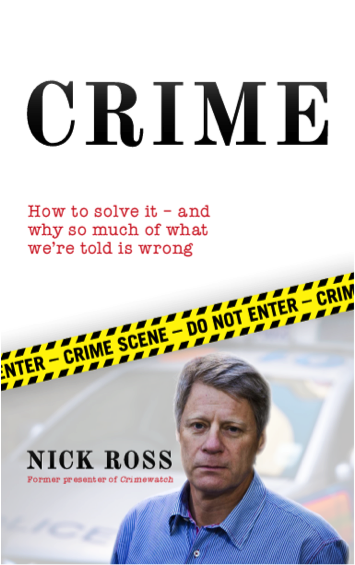5.0 out of 5 stars Thoughtful, thought provoking – read the book not the papers
By NorfolkBooks “Norfolk Reviewer”
Nick Ross sets out his position from the outset. This is a polemic – a strongly put argument that much of our understanding of crime and punishment is misguided. And although there are points of detail one could argue about for the most part he’s right. He’s adopted an interesting approach to the evidence upon which he bases his arguments, relegating it to an accompanying website. But the crucial point is that he does cite a lot of academic research in support of his various arguments.
He does run the risk of diluting some of his points by the welter of statistics which he uses in the book (simply because you then have to go to the website to check the source of his stats and then consider whether you agree with his interpretation of the stats and after a while this becomes a bit tedious).
Perhaps the most amusing part of the book is the chapter on the way the media consistently misrepresent crime which they then proceeded, with a wholly predictable inevitability, to do to the book. The focus on the chapter on sex offences was predictable as was their request to critics to denounce the suggestion that some rapes are more serious than others. Try reading the book and you will see that Mr Ross has a clear concern for victims and at no point condones sexual offenders, but that does not stop him from questioning some of the views routinely offered on the issue. Sadly the British media love to polarise such issues, which simply inhibits mature, reasoned debate. So simply take them out of the equation and read the book and consider it for yourself.
5.0 out of 5 stars Ross on crime
By Lord Taverne
One of the most important comments on our social problems that I have read. Nick Ross ruthlessly exposes numerous myths about crime that seem to be accepted by many civil servants, MPs, journalists, social workers, judges, the public at large and most important of all, the Home Office. It is a stimulating read, an essential one for anyone concerned to see policy based on evidence rather than prejudice.
5.0 out of 5 stars The media response proves the point
By Eleanor Burnham
I don’t usually write reviews but the media hysteria about this particular book prompted me to respond. I have read the book, which seems to be more than many of the journalists and other commentators. Ross’s views are radical and innovative; the book is both readable and well researched. And I think it is right. The public understanding of crime, much of it heavily influenced by its media representation, is not reflected in the reality of the phenomenon. As a consequence we end up with too many people in prison and too many victims. Contrary to many of the accusations in the media, Ross’s sympathy with the victims of crime, and for that matter many of the offenders, comes across throughout. I hope more people, particularly the politicians and decision makers, will find the time to read this book. It is an easy read presenting a difficult message.
5.0 out of 5 stars Front To Back In A Day!,
By RGS Yorkshire
This is a very, very good book.
Sometimes, when an issue becomes a matter of academic, public and political discourse, the actual issue disappears into a mist of half-truths and deliberate misrepresentation. Such is the case with crime.
Nick Ross, in this excellent book, blows away the mist and exposes the truth using relevant evidence.
His solution is teasingly simple.
A really absorbing, thoroughly enjoyable and thought-provoking book. Highly recommended.
5.0 out of 5 stars Honest, so reviled
By aniwright
Nick Ross has written a fine, honest and useful book. Its serialisation in the Mail on Sunday has evoked a storm of criticism of what he is presumed to have written, but hasn’t. It seems that only a few questions about crime are allowable and any more nuanced depiction is reduced to a position on the formulaic question. Thus, for example, any discussion of rape has to be reduced to the question of whether ‘No means no’. Of course it does. Nothing in the book remotely suggests otherwise, but Ross is castigated as though this were the issue he addresses. Any reasonable person reading the book alongside the media feeding frenzy will end up feeling very sorry for its author.
5.0 out of 5 stars The best book on crime that I have read
I found the book inspirational. So many dead ends and failed policy’s on dealing with crime and now a book that shines a light on how to go forward, undo the negative approaches we have been following and actually make a difference.
Brilliantly written and researched,controversial at times, but at last an honest book on the causes of crime and how to deal with it.
As a magistrate for ten years, seeing the same people committing the same crimes on the carousel of criminal injustice, I wish that every home secretary was forced to read this book from cover to cover.
Highly recommended
See many more reviews on Amazon at http://www.amazon.co.uk/product-reviews/1849544999/ref=cm_cr_dp_see_all_btm?ie=UTF8&showViewpoints=1&sortBy=bySubmissionDateDescending.








 In a whirlwind demolition of dozens of misconceptions about crime, Nick Ross proposes what is arguably the most radical re-think of crime policy since the dawn of policing. Setting conventional thinking on its head CRIME challenges everything we take for granted. Nick Ross demonstrates why the criminal justice system has little effect on crime rates, how policing has been hijacked to serve the needs of lawyers, and how “facts” about crime are continually manipulated to serve the needs of politicians and the media.
In a whirlwind demolition of dozens of misconceptions about crime, Nick Ross proposes what is arguably the most radical re-think of crime policy since the dawn of policing. Setting conventional thinking on its head CRIME challenges everything we take for granted. Nick Ross demonstrates why the criminal justice system has little effect on crime rates, how policing has been hijacked to serve the needs of lawyers, and how “facts” about crime are continually manipulated to serve the needs of politicians and the media.